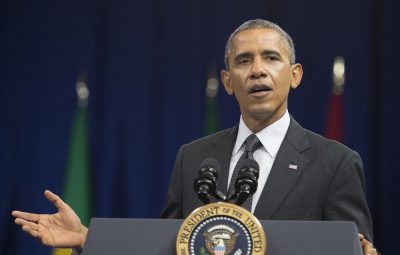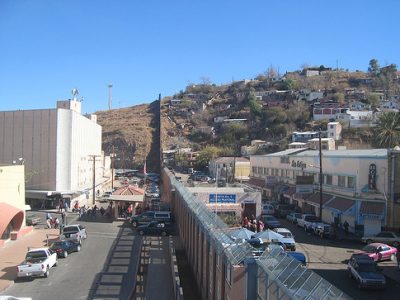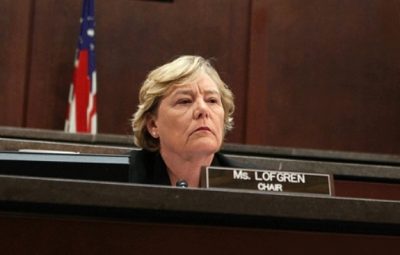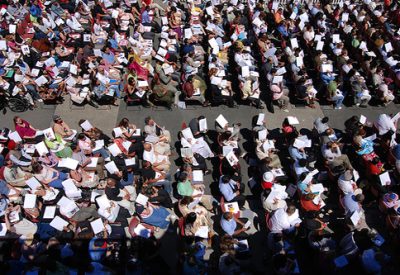Immigration Reform
The last time Congress updated our legal immigration system was November 1990, one month before the World Wide Web went online. We are long overdue for comprehensive immigration reform.
Through immigration reform, we can provide noncitizens with a system of justice that provides due process of law and a meaningful opportunity to be heard. Because it can be a contentious and wide-ranging issue, we aim to provide advocates with facts and work to move bipartisan solutions forward. Read more about topics like legalization for undocumented immigrants and border security below.
E Pluribus Unum and the GOP English Mandate
As expected, the Republican platform contains lots of tough immigration-enforcement language as well as an outright rejection of “amnesty.” Yet one of the more paradoxical sections is on immigrant integration and the English language. According to the platform: One sign of our unity is our English language. For newcomers, it has always been the fastest route to prosperity in America. English empowers. We support English as the official language in our nation, while welcoming the ethnic diversity in the United States and the territories, including language. Immigrants should be encouraged to learn English. English is the accepted language of business, commerce, and legal proceedings, and it is essential as a unifying cultural force. It is also important, as part of cultural integration, that our schools provide better education in U.S. history and civics for all children, thereby fostering a commitment to our national motto, E Pluribus Unum. Maybe immigrants should be encouraged to learn Latin so they can keep up with all of our American ideals.Did the Republican drafters really fail to catch the irony there? Ninety-nine percent of the GOP’s paragraph is indisputable. English is an empowering, unifying force. But making English the official language of the U.S. is not going to force anyone to learn English any faster. By including this point in their platform, the GOP stokes Americans’ misguided suspicions that immigrants don’t want to learn English. Shame on the GOP for playing into fears and stereotypes. Read More

What Obama’s Speech Means for Immigration
Immigration was not overlooked during Barack Obama's momentous closing speech on Thursday night. "Passions fly on immigration," said Obama, "but I don't know anyone who benefits when a mother is separated from her infant child or an employer undercuts American wages by hiring illegal workers. This too is part of America's promise - the promise of a democracy where we can find the strength and grace to bridge divides and unite in common effort." At the very end of a Democratic National Convention during which immigration was often shadowed by the politics of the race and the burning issues of Iraq and the economy, Obama made sure that immigration was written into his history-making speech. Read More

DNC Live: National Hispanic Leadership Agenda
Yesterday the National Hispanic Leadership Agenda (NHLA)--a nonpartisan association of Hispanic organizations and leaders--announced a bold new policy agenda at the DNC, calling upon elected officials, candidates, political parties, the media and the general public to consider and adopt the NHLA platform. The Hispanic Policy Agenda addresses prime policy issues facing Hispanics in six main issue areas: Education Civil rights Immigration Economic Empowerment Health Government Accountability NHLA Chair and President of the Mexican American Legal Defense Fund (MALDEF), John Trasvina, began by introducing the purpose of the National Hispanic Leadership Agenda as being the establishment of a set of principles and priorities that the candidates need to adopt if they want to gain the support of the Latinos. "We need to make sure that the truth is spoken about immigration and the needs of the Latino community and we don't let others define what we are," said Trasvina. Read More

DNC Live: Janet Murguia Concludes NDN Immigration Forum
Janet Murguia, CEO of President of National Council of La Raza was the final speaker at NDN's Immigration Reform and the Next Administration forum event at the DNC. Murguia wanted to add another dimension to the conversation by pointing out that as a Latina, she and her fellow Latinos care about a lot of issues--yet immigration is the single issue that crosses across the community and is mobilizing Latinos across the country. Read More

DNC Live: NDN Immigration Forum Resumes with Frank Sharry
Frank Sharry, Executive Director of America's Voice was the third speaker featured at NDN's Immigration Reform and the Next Administration forum event. Sharry began by providing a definition for attrition through enforcement: From the policy point of view, attrition through enforcement assumes we have good laws and bad people and what we have to do is enforce the good laws so that the bad people go away. The idea is to make life so miserable so people will leave. He referred to it as more accurately being a form of "non-violent ethnic cleansing"--making a bad problem worse. Read More

DNC Live: Marco Lopez Continues NDN Immigration Discussion
The next speaker at the NDN's Immigration Reform and the Next Administration forum event at the DNC was Marco Lopez of Arizona, a rising star in American politics. Lopez talked about what Arizona has had to do "creatively" to tackle the growing trend of migration from South to North, acknowledging that Arizona--as one of the fastest growing states--needs workers. Read More

DNC Live: NDN Immigration Forum with Zoe Lofgren
NDN is currently holding a forum on Immigration Reform and the Next Administration at the Democratic National Convention in Denver. NDN President Simon Rosenberg began the conversation acknowledging that the Democrats have "woken up" to the relevance of the immigrant voting population in the upcoming election. NDN Vice-president, Andres Ramirez, introduced Congresswoman and Chairman of the House Committee on Immigration Reform, Zoe Lofgren of California. Read More

What Biden Means for Immigration Reform
This past weekend, presumptive Democratic nominee, Barack Obama, introduced Joseph Biden of Delaware as his vice-presidential running mate. Pro-immigrant and labor groups have lauded Obama's decision to run next to a six-term senator with foreign policy expertise and a firm commitment to comprehensive immigration reform. Frank Sharry of America's voice and a featured panelist at NDN's Immigration Reform and the Next Administration forum event at the DNC said in a released statement "As a member of the Senate Judiciary Committee, he [Biden] has been a strong, consistent and unwavering supporter of common sense immigration reform. Biden understands, as do the majority of Americans, that the immigration system is broken and the current Administration has failed miserably to solve the problem." Read More

Olympic Win Highlights Immigration Challenges
On Tuesday night, Henry Cejudo nabbed an Olympic gold medal for the U.S. and realized the dream that his mother, Nelly Rico, carried with her as she crossed the border from Mexico over twenty years ago. Rico—an undocumented immigrant—encouraged her children to work hard and aim high. Now her son is an American hero and the youngest American wrestler to win a gold in the Olympics. Read More

Immigrants Integrate as Census Predicts Minority Boom
Over five hundred immigrants gathered on July 4, 2007 to take the oath of citizenship. Last week the US Census Bureau projected that minorities will grow to become a majority by the year 2042. A recent New York Times article pointed out that the main reason for the accelerating change is significantly higher birthrates among immigrants. While some fear that demographic shifts threaten American identity, research and experience has shown that today’s immigrants integrate into American society just as generations of immigrants before them. Immigrants are learning English, buying property, intermarrying, becoming U.S. citizens, and otherwise weaving themselves into the fabric of this nation. Read More
Make a contribution
Make a direct impact on the lives of immigrants.
